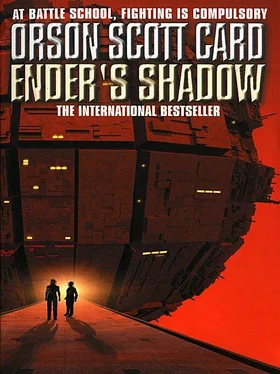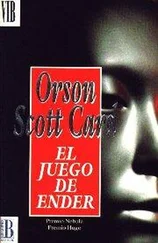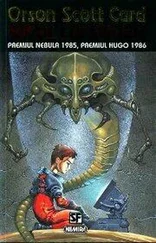Orson Card - Ender's Shadow
Здесь есть возможность читать онлайн «Orson Card - Ender's Shadow» весь текст электронной книги совершенно бесплатно (целиком полную версию без сокращений). В некоторых случаях можно слушать аудио, скачать через торрент в формате fb2 и присутствует краткое содержание. Жанр: Фантастика и фэнтези, на английском языке. Описание произведения, (предисловие) а так же отзывы посетителей доступны на портале библиотеки ЛибКат.
- Название:Ender's Shadow
- Автор:
- Жанр:
- Год:неизвестен
- ISBN:нет данных
- Рейтинг книги:4 / 5. Голосов: 1
-
Избранное:Добавить в избранное
- Отзывы:
-
Ваша оценка:
- 80
- 1
- 2
- 3
- 4
- 5
Ender's Shadow: краткое содержание, описание и аннотация
Предлагаем к чтению аннотацию, описание, краткое содержание или предисловие (зависит от того, что написал сам автор книги «Ender's Shadow»). Если вы не нашли необходимую информацию о книге — напишите в комментариях, мы постараемся отыскать её.
Ender's Shadow — читать онлайн бесплатно полную книгу (весь текст) целиком
Ниже представлен текст книги, разбитый по страницам. Система сохранения места последней прочитанной страницы, позволяет с удобством читать онлайн бесплатно книгу «Ender's Shadow», без необходимости каждый раз заново искать на чём Вы остановились. Поставьте закладку, и сможете в любой момент перейти на страницу, на которой закончили чтение.
Интервал:
Закладка:
"I'm about as big as a three-year-old," said Bean. "I don't think a lot of kids are eager to start saluting me."
"But you could be building networks of friendship. The other kids are. You don't."
"I guess I don't have what it takes to be a commander."
Dimak raised an eyebrow. "Are you suggesting you want to be iced?"
"Do my test scores look like I'm trying to fail?"
"What do you want?" asked Dimak. "You don't play the games the other kids play. Your exercise program is weird, even though you know the regular program is designed to strengthen you for the battleroom. Does that mean you don't intend to play that game, either? Because if that's your plan, you really will get iced. That's our primary means of assessing command ability. That's why the whole life of the school is centered around the armies."
"I'll do fine in the battleroom," said Bean.
"If you think you can do it without preparation, you're mistaken. A quick mind is no replacement for a strong, agile body. You have no idea how physically demanding the battleroom can be."
"I'll join the regular workouts, sir."
Dimak leaned back and closed his eyes with a small sigh. "My, but you're compliant, aren't you, Bean."
"I try to be, sir."
"That is such complete bullshit," said Dimak.
"Sir?" Here it comes, thought Bean.
"If you devoted the energy to making friends that you devote to hiding things from the teachers, you'd be the most beloved kid in the school."
"That would be Ender Wiggin, sir."
"And don't think we haven't picked up on the way you obsess about Wiggin."
"Obsess?" Bean hadn't asked about him after that first day. Never joined in discussions about the standings. Never visited the battleroom during Ender's practice sessions.
Oh. What an obvious mistake. Stupid.
"You're the only launchy who has completely avoided so much as seeing Ender Wiggin. You track his schedule so thoroughly that you are never in the same room with him. That takes real effort."
"I'm a launchy, sir. He's in an army."
"Don't play dumb, Bean. It's not convincing and it wastes my time."
Tell a useless and obvious truth, that was the rule. "Everyone compares me to Ender all the time 'cause I came here so young and small. I wanted to make my own way."
"I'll accept that for now because there's a limit to how deeply I want to wade into your bullshit," said Dimak.
But in saying what he'd said about Ender, Bean wondered if it might not be true. Why shouldn't I have such a normal emotion as jealousy? I'm not a machine. So he was a little offended that Dimak seemed to assume that something more subtle had to be going on. That Bean was lying no matter what he said.
"Tell me," said Dimak, "why you refuse to play the fantasy game."
"It looks boring and stupid," said Bean. That was certainly true.
"Not good enough," said Dimak. "For one thing, it isn't boring and stupid to any other kid in Battle School. In fact, the game adapts itself to your interests."
I have no doubt of that , thought Bean. "It's all pretending," said Bean. "None of it's real."
"Stop hiding for one second, can't you?" snapped Dimak. "You know perfectly well that we use the game to analyze personality, and that's why you refuse to play."
"Sounds like you've analyzed my personality anyway," said Bean.
"You just don't let up, do you?"
Bean said nothing. There was nothing to say.
"I've been looking at your reading list," said Dimak. "Vauban?"
"Yes?"
"Fortification engineering from the time of Louis the Fourteenth?"
Bean nodded. He thought back to Vauban and how his strategies had adapted to fit Louis's ever-more-straitened finances. Defense in depth had given way to a thin line of defenses; building new fortresses had largely been abandoned, while razing redundant or poorly placed ones continued. Poverty triumphing over strategy. He started to talk about this, but Dimak cut him off.
"Come on, Bean. Why are you studying a subject that has nothing to do with war in space?"
Bean didn't really have an answer. He had been working through the history of strategy from Xenophon and Alexander to Caesar and Machiavelli. Vauban came in sequence. There was no plan -- mostly his readings were a cover for his clandestine computer work. But now that Dimak was asking him, what did seventeenth-century fortifications have to do with war in space?
"I'm not the one who put Vauban in the library."
"We have the full set of military writings that are found in every library in the fleet. Nothing more significant than that."
Bean shrugged.
"You spent two hours on Vauban."
"So what? I spent as long on Frederick the Great, and I don't think we're doing field drills, either, or bayoneting anyone who breaks ranks during a march into fire."
"You didn't actually read Vauban, did you," said Dimak. "So I want to know what you were doing."
"I was reading Vauban."
"You think we don't know how fast you read?"
"And thinking about Vauban?"
"All right then, what were you thinking?"
"Like you said. About how it applies to war in space." Buy some time here. What does Vauban have to do with war in space?
"I'm waiting," said Dimak. "Give me the insights that occupied you for two hours just yesterday."
"Well of course fortifications are impossible in space," said Bean. "In the traditional sense, that is. But there are things you can do. Like his mini-fortresses, where you leave a sallying force outside the main fortification. You can station squads of ships to intercept raiders. And there are barriers you can put up. Mines. Fields of flotsam to cause collisions with fast-moving ships, holing them. That sort of thing."
Dimak nodded, but said nothing.
Bean was beginning to warm to the discussion. "The real problem is that unlike Vauban, we have only one strong point worth defending -- Earth. And the enemy is not limited to a primary direction of approach. He could come from anywhere. From anywhere all at once. So we run into the classic problem of defense, cubed. The farther out you deploy your defenses, the more of them you have to have, and if your resources are limited, you soon have more fortifications than you can man. What good are bases on moons Jupiter or Saturn or Neptune, when the enemy doesn't even have to come in on the plane of the ecliptic? He can bypass all our fortifications. The way Nimitz and MacArthur used two-dimensional island-hopping against the defense in depth of the Japanese in World War II. Only our enemy can work in three dimensions. Therefore we cannot possibly maintain defense in depth. Our only defense is early detection and a single massed force."
Dimak nodded slowly. His face showed no expression. "Go on."
Go on? That wasn't enough to explain two hours of reading? "Well, so I thought that even that was a recipe for disaster, because the enemy is free to divide his forces. So even if we intercept and defeat ninety-nine of a hundred attacking squadrons, he only has to get one squadron through to cause terrible devastation on Earth. We saw how much territory a single ship could scour when they first showed up and started burning over China. Get ten ships to Earth for a single day -- and if they spread us out enough, they'd have a lot more than a day! -- and they could wipe out most of our main population centers. All our eggs are in that one basket."
"And all this you got from Vauban," said Dimak.
Finally. That was apparently enough to satisfy him. "From thinking about Vauban, and how much harder our defensive problem is."
"So," said Dimak, "what's your solution?"
Solution? What did Dimak think Bean was? I'm thinking about how to get control of the situation here in Battle School, not how to save the world! "I don't think there is a solution," said Bean, buying time again. But then, having said it, he began to believe it. "There's no point in trying to defend Earth at all. In fact, unless they have some defensive device we don't know about, like some way of putting an invisible shield around a planet or something, the enemy is just as vulnerable. So the only strategy that makes any sense at all is an all-out attack. To send our fleet against their home world and destroy it."
Читать дальшеИнтервал:
Закладка:
Похожие книги на «Ender's Shadow»
Представляем Вашему вниманию похожие книги на «Ender's Shadow» списком для выбора. Мы отобрали схожую по названию и смыслу литературу в надежде предоставить читателям больше вариантов отыскать новые, интересные, ещё непрочитанные произведения.
Обсуждение, отзывы о книге «Ender's Shadow» и просто собственные мнения читателей. Оставьте ваши комментарии, напишите, что Вы думаете о произведении, его смысле или главных героях. Укажите что конкретно понравилось, а что нет, и почему Вы так считаете.









